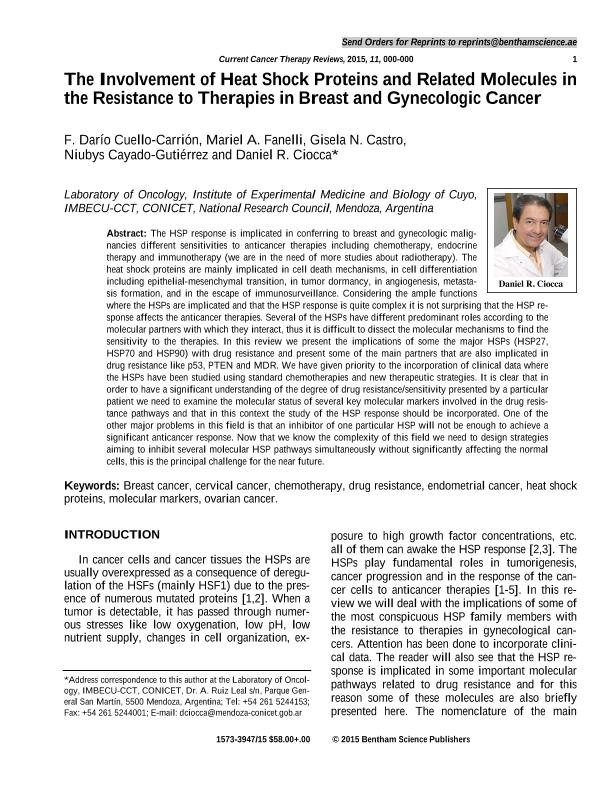Mostrar el registro sencillo del ítem
dc.contributor.author
Cuello Carrión, Fernando Darío

dc.contributor.author
Fanelli, Mariel Andrea

dc.contributor.author
Castro, Gisela Natalia

dc.contributor.author
Cayado Gutiérrez, Niubys de Los Milagros

dc.contributor.author
Ciocca, Daniel Ramon

dc.date.available
2018-03-27T21:17:21Z
dc.date.issued
2015-10
dc.identifier.citation
Cuello Carrión, Fernando Darío; Fanelli, Mariel Andrea; Castro, Gisela Natalia; Cayado Gutiérrez, Niubys de Los Milagros; Ciocca, Daniel Ramon; The involvement of heat shock proteins and related molecules in the resistance to therapies in breast and gynecologic cancer; Bentham Science Publishers; Current Cancer Therapy Reviews; 11; 4; 10-2015; 201-221
dc.identifier.issn
1573-3947
dc.identifier.uri
http://hdl.handle.net/11336/40281
dc.description.abstract
The HSP response is implicated in conferring to breast and gynecologic malignancies different sensitivities to anticancer therapies including chemotherapy, endocrine therapy and immunotherapy (weare in the need of more studies about radiotherapy). The heat shock proteins are mainly implicated in cell death mechanisms, in cell differentiation including epithelial-mesenchymal transition, in tumordormancy, in angiogenesis, metastasis formation, and in the escape of immunosurveillance. Considering the ample functions where the HSPs are implicated and that the HSP response is quite complex it is not surprising that the HSP response affects the anticancer therapies. Several of the HSPs have different predominant roles according to the molecular partners with which they interact, thus it is difficult to dissect the molecular mechanisms to find the sensitivity to the therapies. In this review we present the implications of some the major HSPs (HSP27, HSP70 and HSP90) with drug resistance and present some of the main partners that are also implicated in drug resistance like p53, PTEN and MDR. We have given priority to the incorporation of clinical data where the HSPs have been studied using standard chemotherapies and new therapeutic strategies. It is clear that in order to have a significant understanding of the degree of drug resistance/sensitivity presented by a particular patient we need to examine the molecular status of several key molecular markers involved in the drug resistance pathways and that in this context the study of the HSP response should be incorporated. One of the other major problems in this field is that an inhibitor of one particular HSP will not be enough to achieve a significant anticancer response. Now that we know the complexity of this field we need to design strategies aiming to inhibit several molecular HSP pathways simultaneously without significantly affecting the normal cells, this is the principal challenge for the near future.
dc.format
application/pdf
dc.language.iso
eng
dc.publisher
Bentham Science Publishers

dc.rights
info:eu-repo/semantics/openAccess
dc.rights.uri
https://creativecommons.org/licenses/by-nc-sa/2.5/ar/
dc.subject
Breast Cancer
dc.subject
Cervical Cancer
dc.subject
Chemotherapy
dc.subject
Drug Resistance
dc.subject
Endometrial Cancer
dc.subject
Heat Shock Proteins
dc.subject
Molecular Markers
dc.subject
Ovarian Cancer
dc.subject.classification
Inmunología

dc.subject.classification
Medicina Básica

dc.subject.classification
CIENCIAS MÉDICAS Y DE LA SALUD

dc.title
The involvement of heat shock proteins and related molecules in the resistance to therapies in breast and gynecologic cancer
dc.type
info:eu-repo/semantics/article
dc.type
info:ar-repo/semantics/artículo
dc.type
info:eu-repo/semantics/publishedVersion
dc.date.updated
2018-03-27T13:36:14Z
dc.journal.volume
11
dc.journal.number
4
dc.journal.pagination
201-221
dc.journal.pais
Emiratos Árabes Unidos

dc.journal.ciudad
Sharjah
dc.description.fil
Fil: Cuello Carrión, Fernando Darío. Consejo Nacional de Investigaciones Científicas y Técnicas. Centro Científico Tecnológico Conicet - Mendoza. Instituto de Medicina y Biología Experimental de Cuyo; Argentina
dc.description.fil
Fil: Fanelli, Mariel Andrea. Consejo Nacional de Investigaciones Científicas y Técnicas. Centro Científico Tecnológico Conicet - Mendoza. Instituto de Medicina y Biología Experimental de Cuyo; Argentina
dc.description.fil
Fil: Castro, Gisela Natalia. Consejo Nacional de Investigaciones Científicas y Técnicas. Centro Científico Tecnológico Conicet - Mendoza. Instituto de Medicina y Biología Experimental de Cuyo; Argentina
dc.description.fil
Fil: Cayado Gutiérrez, Niubys de Los Milagros. Consejo Nacional de Investigaciones Científicas y Técnicas. Centro Científico Tecnológico Conicet - Mendoza. Instituto de Medicina y Biología Experimental de Cuyo; Argentina
dc.description.fil
Fil: Ciocca, Daniel Ramon. Consejo Nacional de Investigaciones Científicas y Técnicas. Centro Científico Tecnológico Conicet - Mendoza. Instituto de Medicina y Biología Experimental de Cuyo; Argentina
dc.journal.title
Current Cancer Therapy Reviews
dc.relation.alternativeid
info:eu-repo/semantics/altIdentifier/doi/http://dx.doi.org/10.2174/1573394712666151215213709
dc.relation.alternativeid
info:eu-repo/semantics/altIdentifier/url/http://www.eurekaselect.com/137841/article
Archivos asociados
